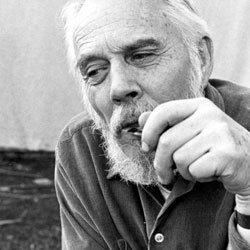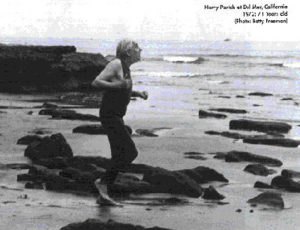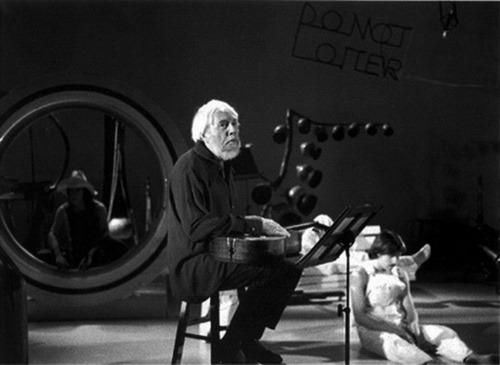Harry Partch (June 24, 1901 – September 3, 1974) was an American composer. He was one of the first twentieth-century composers to work extensively and systematically with microtonal scales, writing much of his music for instruments he built himself, tuned in 11-limit just intonation.
Interested in the potential musicality of speech, Partch worked out his first extended scales to notate the inflections of the speaking voice. He built his adapted viola to demonstrate the concept. In London on a grant he met the poet W. B. Yeats with the intention of gaining his permission to write an opera based on his translation of Sophocles’ Oedipus the King. He took another instrument he had built, an adapted guitar, to the meeting, and accompanied himself in one of his own songs on it. Yeats was enthusiastic, saying “a play done entirely in this way, with this wonderful instrument, and with this type of music, might really be sensational”, and giving Partch’s idea his blessing.
Partch set about building more instruments with which to realise his opera. However, his grant money ran out, and, back in the United States, he began to live as a hobo, travelling around on trains and taking casual work where he could find it. He continued in this way for ten years, writing about his experiences in journals that were later collected together under the title Bitter Music.
Read a Better Biography than the above.
—
MUSIC, ESSAYS, DOCU and INTERVIEWS IN PUBLIC
@ scribd
—
—
Harry Partch – an American Original

@ Ubu.com
PART II: HERITAGES & ATTITUDES
HARRY PARTCH: Monophonic Just Intonation (excerpted)
HARRY PARTCH: No Barriers
This podcast features narrated selections from the series including Louise Lawler, Jerome Rothenberg, Gregory Whitehead, Glenn Branca, Harry Partch and Paul Bowles.
A Bibliography of Recorded Works by Artists (Dan Lander and Micah Lexier)
• Partch, Harry. Genesis of a Music. Madison: University of Wisconsin Press, 1949
A Discography of Recorded Works by Artists (Dan Lander and Micah Lexier)
• Partch, Harry. Delusion of the Fury. LP. New York: CBS Masterworks, 1971.
Director: Darren Chesworth
Year: 2002
Time: 59 mins
Music: Harry Partch
From “Eye of Sound”: His obsession with the subjective human voice and the musicality of speech; his partly relativistic deconstruction of the twelve-note scale as an arbitrary straitjacket; his ethnographic sensibility towards different modes of conceiving language, tuning and existence; his need to create channels suited for his new microtonal chromatic universe; his expansion into convergent fields of expression such as film, theatre and dance; and his desire to capture the vernacular as a locus for the textures of being – all these probably make Partch’s the most encompassing of modern creative utopias.
Such an overarching project of existence and creation, obviously, could hardly be comprised in an one-hour documentary, and it would take a considerable amount of creativity and an unflinching focus to cast a shadow of justice over Partch’s vision in such a short time. One aspect that could have been jettisoned is, as usual, the biographic mode, the linear movement from A to Z that suggests apparently logic explanations and connections for processes and objects that are far from logical and linear, supported by an invisible voice-over narration that simulates contextualization and sequence. Narrative becomes a form of containment and disambiguation: Partch’s struggle with devitalized modes of composition and the 12-tone octave is all of a sudden brought into light by the reading of one single book, On the Sensation of Tone by H. Helmholtz, and his “discovery” of the arbitrary nature of the Western scale smoothly harmonised with his several inner and outer “deviances”, sexuality included; inversely, Partch’s long-celebrated and romanticised decision to follow a hobo trail for almost a decade is simply glossed as a reaction to the Great Depression and left strangely disconnected from the surrounding acts. There are the usual statements by friends, patrons and composers, such as Lou Harrison, Gavin Bryars, John Schneider, Phillip Blackburn, and Phillip Glass, adding very little to our understanding of Partch’s universe, and it is from biographers and archivists that the most illuminating comments stem from. While the focus on the apparent eccentricity of the man seems to be a fruitless compromise with the conventions of current personality cults – including a minor polemic with Cage to boot -, it is not surprising that the most rewarding sections focus on the technical aspects of his work, microtonality being efficiently summarised bur perhaps not fully explored in its symbolic reach. The eclipse of “the truth of just intonation” was seen by Partch as a conspiracy in which “pure” musical structures had been corrupted and dilluted by a powerful but stifling hierarchical model, one that curtailed freedom and fostered forms of conformism. This supposedly pure tuning of ancient Greek tradition, which Partch tried to build into his microtonal edifice, and its promises of a wider access to the the truth that is supposed to inhere in the human voice, holds some of the keys for the composer’s universe: a romantic search for a temps perdu, thought to be found both in ancient traditions and non-Western contemporary societies, guided, as ever, by a subversive desire to implode homeland strictures.
—
Harry Partch Memorial (September 5, 1974)
Harry Partch – Twelve Instrusions
Evenings on the Roof 1-6, Radio Docu series by Peter Yates, 1966
1 is an excerpt from one of Partch’s pieces followed by a 1960 interview of Partch by Peter Yates, in which he discusses his career.
2 “Revelation in the Courthouse Park” a piece of musical theater based on The Bacchae by Euripides
part a
part b
3 “The Bewitched”, a dance satire
http://archive.org/details/EveningsonRoofNo3
4 Evenings on the Roof (September 6, 1965) (is missing?)
Harry Partch introduces himself, his 43-tone scale, and demonstrates his instruments. Music selections in this episode played and sung by Partch, from Gate 5 Records: [9:09] wordless piece marked “steady in an ancient phrygian scale” [10:27] wordless piece marked “steady in a Greek enharmonic scale” [12:20] “The Rose” [13:58] “The Crane” based on a text by Lao Tze [15:35] “The Wind” [17:13] “The Waterfall” [18:17] “The Letter” based on a depression-era letter from a hobo [21:03] “The Street” about gritty street life
5 ”Exhibition of Gymnasts”, ”Even Wild Horses”, and [??]
http://archive.org/details/ER_1966_09_06
6 ”Oedipus”
http://archive.org/details/ER_1966_09_11
Harry Partch, 30 years of lyrical and dramatic music.
A selection of songs by Harry Partch. The Poems by Li Po include: A midnight farewell; Before the cast of wine; An encounter in the field; On hearing the flute at Lo-cheng; The intruder; I am a peach tree. Windsong is an excerpt from the soundtrack for the film of the same name. It is a modern rendering of the ancient myth of Daphne and Apollo.
Internet Archive Avant Garde Project installment agp57 “The World of Harry Partch.
Sampling Harry partch’s Instruments
—
@ various
Harry Partch ringtones…
—
OTHER
Rough Diamond
Symphonic con brio using the Partch 13-limit tonality diamond as a scale.

